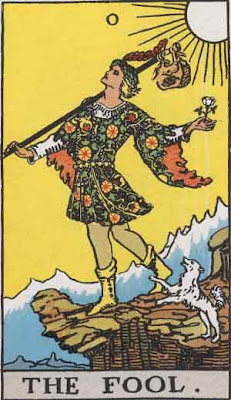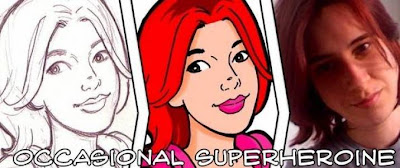
It always seemed to me that the most powerful fictional characters would not be determined by their strength, wealth, or intelligence – but rather, by their ability to realize they were fictional.
For what good is everything else if you are not aware of your own fictionality, of the true nature of your very existence?

In this sense, a character like Deadpool's exemplary physical durability is really just a metaphor for his enlightenment as to the fact that he is a fictional character. Fictional characters can be chopped up, burnt, exploded, decapitated, what have you – but they cannot truly die, as long as there is at least one person existing who can keep creating stories (official or otherwise) about them.

Deadpool represents the first card of the Tarot deck – techincally the first card, but not the card labelled "1." No, the first card, The Fool, is a "0." The Fool is off the grid. The grid being interpreted as Maya, as the delusional/fictional reality. Or: the grid as comic book grid, as a sequence of panels on the page.
Thus, Deadpool plays the part of Fool, but he just might be, due to his self-awareness, the most powerful character in the Marvel Universe.

Similarly, the entity known as Superboy/Superboy Prime/Superman Prime is by far one of the most powerful beings in the DC Universe (though Animal Man, by virtue of his close collaboration with Grant Morrison, comes in a close second, I think).
Of course, The Super Prime Entity is insane, which shows the inherent danger in this entire game. He took things too seriously. He devolved into insanity. Whereas Deadpool protects himself by insanity & foolishness being his initial starting point. The Super Prime Entity needs to know it all, hence his obsessive trolling of message boards, what have you (which would really drive anyone insane)...

...on the other hand, Wade Wilson, like any of the Fool/Trickster archetype – Heyoka, Coyote, Loki, Eshu, Bugs Bunny – seemingly knows nothing, and only is interested in jokes and tricks. Deadpool is an idiot – and yet he has achieved contact with the world outside the boundaries of the grid. Deadpool has achieved enlightenment but wears the cloak of insanity/foolishness in order to process it. Whereas the Super Prime Entity is a know-it-all douchebag with no sense of humor.
As an interesting side-note, the traditional colors of the Yoruban Fool/Trickster god Eshu are red and black, as is of course Deadpool's costume.


Now, you might have experienced a certain "tingle" at those moments in fiction when the character turns around and acknowledges you. There is the famous scene in Animal Man, of course, where Buddy Baker turns to the world outside the panel and freaks out, locking eyes with yours. Or how about when Ferris Bueller (another Fool/Trickster archetype) addresses you throughout the course of his movie? In these instances, something truly special is taking place – you and the fictional character are "having a moment." There is a real interface that takes place, if only for those few seconds of contact. Yes, just like in the A-Ha video.

It is not coincidence that the two comic book writers who have most explicitly discussed these matters in their work, Alan Moore and Grant Morrison, have both practiced magick. They are shamans using the tool of the comic book quite literally and purposefully as part of a mystic working stretching/expanding our conceptions of fiction & reality. They are not merely gently touching the invisible barrier between reader and read – they are like the Super Prime Entity smashing that last wall, "punching time."

The sequence of panels in my old blog banner used to bother me. If we read the three panels in the standard Western way, from left to right, it seems that "I" (Occasional Superheroine) start as as pencil drawing, get color and ink dropped in, and then become a photograph of a real person. Whereas the way it really happened, of course, is that it started with a photograph given to an artist, penciled, and then ink/color dropped in. Though ACTUALLY, it started with me (real me) taking the photograph, then photograph itself, then pencils, then color/ink, then scan/digitization.

But then again, even that woman in the photograph no longer quite exists. Her hair is different. She's older. Her thoughts have developed. A good number of her cells have died and been replaced. The photographs, her writings, her memories, and the memories of others are the only real touchstones that this particular version even existed at all. We can't go back and find this 2007 me, physically point to her, and use her as some sort of hard evidence for the fact that she actually existed. All we have are memories and various media.
It is said that to our subconscious, fantasy & reality look pretty much the same. That a dream vividly experienced registers in the subconscious the same as a "real" event. How does our brains, then, process the fictional? In the grand matrix of our minds, where are the adventures of Deadpool, the Super Primes, etc. stored, and how are they regarded? They are filed away with our memories of real life events. Memories and media, anecdotes and images, recollections and typed words transfered into thought – it's all in the same file cabinet.

All we have is This Moment. And if "this moment" happens to be you curling up with your favorite movie or comic book – in that pinpoint of a moment, it is all real. In that pinpoint of a moment, Ferris Bueller is really locking eyes with you and addressing you, playing the part of Heyokah, playing the part of the Fool, playing the part of Bugs Bunny, trying to make you understand not just the nature of his world but your own. And trying to do it with a degree of good humor, frosting it with sillyness and humor, so as for your tender minds not to be completely blown.
Of course, I'm probably full of shit.


Hmmm, what a fascinating idea. I'd never really thought of Deadpool as being a trickster analogue; now I don't know if I'll ever not be able to. :) Certainly would explain why I've always found a certain resonance with the character... could make for some interesting workings, too...
ReplyDeleteI liked reading this a great deal.
ReplyDeleteThat "yellow boxes" panel from Deadpool is funny.
ReplyDeleteGod, you are pretty!.
ReplyDeleteDK
erudite
ReplyDeleteI love Deadpool, and all the fourth wall breaking stuff in fiction.
ReplyDeleteBut it simply has no purpose within the actual Marvel/DC universes. By placing it INSIDE continuity, you cheapen the actual world you create. No matter how I or anyone feels about "mainstream" comics currently, it cheapens the world.
love ferris bueller's day off!
ReplyDeletecheck out my blog:
www.windowsillseat.blogspot.com!!
This is probably one of the best pieces you've written for this blog. I thoroughly enjoyed it. it makes one think and see things a bit different.
ReplyDeleteOn a sidenote: I liked the old banner with the pencil-you becoming you-you.
Another home run, Val! Indeed, it seems that the greatest power in fiction is being able to realize that you're in fiction. It reminds me of The Matrix. If you're inside and don't realize it, you're as useful as a pebble. If, however, you realize the limits of your world, you can transcend them. Loving this new direction, but I wish we had the old banner back, or at least, y'know, a banner.
ReplyDeleteTomato
"Breaking the fourth wall" is an old theatrical tradition that used wisely can produce the delightful moments you describe. (Which Shakespeare comedy is it that ends with the characters being told they must wait a year until they can wed, causing them to say, "That's too long for a play" and walk off stage?) Laurel & Hardy did a short where they would wipe from one scene to the next by Stan grabbing the edge of the screen and pulling it across like a sliding panel -- the last time he does this is slips from his fingers and snaps back to its original position.
ReplyDeleteThe Fool has the luxury of not taking anything in the world seriously. This is a benefit when it comes to dealing with the lies that disguise themselves as reality, but can be a detriment when dealing with genuine things. Only when there are more lies than truth does the Fool have an advantage.
Nicely written; lots to think about.
ReplyDeleteI like the old banner, and I don't think it necessarily needs to be viewed as a progression. Superheroes are drawn by different artists, and people are viewed through different filters; in a way, the banner is like looking at you from three different angles, or interpreting you three different ways.
I LOVE THIS POST AND WANT TO MARRY IT!
ReplyDeleteVery nicely done Val.
ReplyDeleteThere's a line of superpowers little spoken of that relate to Deadpool's very ability. Also, there's the possibility of revisiting these techniques as a way to recognize the greater sphere of consciousness between artist/reader, imaginary world/real world, which are both the same but which have yet to recognize it. Stanley Kubrick may have been attempting this with 2001.
However, there's difficulty with training the mind to adapt and exist in such dual layers (or multiple layers). There's still the resistance to taking this play seriously enough to recognize it has a life of its own. We so want it to exist only as an on/off switch we can command at will!
I'm thinking of the last episode of Star Trek TNG, where Q tries to teach Picard this very principle of multiple dimensions, each alike yet separate and linked.
Go Val, keep working it out.
btw
ReplyDeleteBuzz sounds like a know-it-all.
Hello. And Bye.
ReplyDeleteEasily one of the best articles you've posted on this blog (since I've been reading it.) - I enjoy your biographical posts, but I've not seen you write a pop essay like this before. The trick with these type of articles is to find some new hypothesis or angle and then support your points in a clever way, and you really did both nicely. Well Done!
ReplyDeleteNot sure if you ever so the old Heckle and Jeckle cartoon. It was on one of the NYC channels I got on cable growing up in the late 70s early 80s.
ReplyDeleteThere was one episode that struck me as brilliant around the age of 10 or so and that was the one where they realized they were cartoon characters and could do anything until the end when the police dog that they were screwing with through the whole episode realized he was also a cartoon character.
Maybe, it's on Youtube somewhere.
Lest ye forget Ambush Bug...
ReplyDeleteGood points about Deadfool. I was touched by the moment in Deadpool #900 (Kyle Baker's part I think?), where Deadpool is trying to kill himself by killing all the readers of the issue. It was very sad and weird at the same time.
ReplyDeleteI think Deadpool's meta-hilariousness is a much bigger part of his recent popularity than his "way-cool-pouchy 90s-Liefeld" roots. I mean, he has like 3 on-goings now right? I know it's mostly played for laughs, but I feel like it adds power to the character.
Dan Slott's She-Hulk breaks the fourth wall as well, no?
Whenever Deadpool and Ferris can be combined in one article, I am a huge fan. Good post!
ReplyDelete